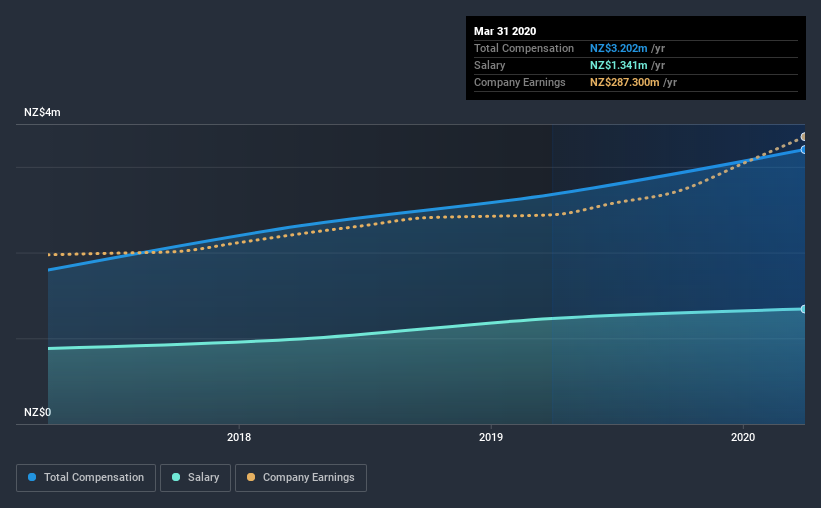How Should Investors Feel About Fisher & Paykel Healthcare's (NZSE:FPH) CEO Remuneration?

Lewis Gradon became the CEO of Fisher & Paykel Healthcare Corporation Limited (NZSE:FPH) in 2016, and we think it's a good time to look at the executive's compensation against the backdrop of overall company performance. This analysis will also assess whether Fisher & Paykel Healthcare pays its CEO appropriately, considering recent earnings growth and total shareholder returns.
View our latest analysis for Fisher & Paykel Healthcare
How Does Total Compensation For Lewis Gradon Compare With Other Companies In The Industry?
Our data indicates that Fisher & Paykel Healthcare Corporation Limited has a market capitalization of NZ$20b, and total annual CEO compensation was reported as NZ$3.2m for the year to March 2020. We note that's an increase of 20% above last year. We think total compensation is more important but our data shows that the CEO salary is lower, at NZ$1.3m.
For comparison, other companies in the industry with market capitalizations above NZ$12b, reported a median total CEO compensation of NZ$9.1m. This suggests that Lewis Gradon is paid below the industry median. What's more, Lewis Gradon holds NZ$20m worth of shares in the company in their own name, indicating that they have a lot of skin in the game.
Component | 2020 | 2019 | Proportion (2020) |
Salary | NZ$1.3m | NZ$1.2m | 42% |
Other | NZ$1.9m | NZ$1.4m | 58% |
Total Compensation | NZ$3.2m | NZ$2.7m | 100% |
On an industry level, around 75% of total compensation represents salary and 25% is other remuneration. Fisher & Paykel Healthcare sets aside a smaller share of compensation for salary, in comparison to the overall industry. It's important to note that a slant towards non-salary compensation suggests that total pay is tied to the company's performance.
Fisher & Paykel Healthcare Corporation Limited's Growth
Over the past three years, Fisher & Paykel Healthcare Corporation Limited has seen its earnings per share (EPS) grow by 19% per year. It achieved revenue growth of 18% over the last year.
Overall this is a positive result for shareholders, showing that the company has improved in recent years. It's also good to see decent revenue growth in the last year, suggesting the business is healthy and growing. Historical performance can sometimes be a good indicator on what's coming up next but if you want to peer into the company's future you might be interested in this free visualization of analyst forecasts.
Has Fisher & Paykel Healthcare Corporation Limited Been A Good Investment?
Boasting a total shareholder return of 238% over three years, Fisher & Paykel Healthcare Corporation Limited has done well by shareholders. This strong performance might mean some shareholders don't mind if the CEO were to be paid more than is normal for a company of its size.
In Summary...
As we noted earlier, Fisher & Paykel Healthcare pays its CEO lower than the norm for similar-sized companies belonging to the same industry. Since earnings growth is heading in a positive direction; many would agree with our assessment that the pay is modest. Given the strong history of shareholder returns, the shareholders are probably very happy with Lewis's performance.
CEO compensation is a crucial aspect to keep your eyes on but investors also need to keep their eyes open for other issues related to business performance. That's why we did some digging and identified 1 warning sign for Fisher & Paykel Healthcare that you should be aware of before investing.
Switching gears from Fisher & Paykel Healthcare, if you're hunting for a pristine balance sheet and premium returns, this free list of high return, low debt companies is a great place to look.
This article by Simply Wall St is general in nature. It does not constitute a recommendation to buy or sell any stock, and does not take account of your objectives, or your financial situation. We aim to bring you long-term focused analysis driven by fundamental data. Note that our analysis may not factor in the latest price-sensitive company announcements or qualitative material. Simply Wall St has no position in any stocks mentioned.
Have feedback on this article? Concerned about the content? Get in touch with us directly. Alternatively, email editorial-team@simplywallst.com.

 Yahoo Finance
Yahoo Finance 
